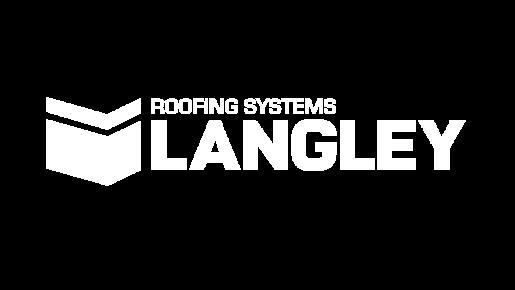
13 minute read
News
News Langley offers solution to efficiently address failing single ply
The life of failing single ply and EPDM roofs can be significantly improved with a dependable, durable and cost-effective solution, that overcomes conventional limitations and issues.
Langley Waterproofing Systems Ltd’s SCR Alliance resilient separation layer membrane creates a protective barrier enabling the roof to be safely upgraded and overlaid (survey dependant) with new waterproofing without the need to strip the existing covering, minimising disruption and impact on the environment with waste to landfill mitigated.
A fleece-backed bituminous membrane, SCR Alliance acts as a separation layer, eliminating the risk of incompatibility between plasticides found within single ply and EPDM materials and the new Reinforced Bituminous membrane (RBM) overlay system. It means roofs can be upgraded and made weathertight all year round, overcoming the seasonal temperature installation considerations inherent with liquid alternatives. It also more easily addresses roof design, particularly those with penetrations and detailing. It eliminates the potential impact of odour on building occupants often associated with liquid systems specifically when the building is still in use during the refurbishment.
SCR Alliance can be mechanically-fixed over existing single ply on a range of structural deck types, whether on educational, residential, healthcare, commercial or industrial estates. When Langley’s RBM systems are installed on top of SCR Alliance, the roof’s lifespan is independently certified via the BBA to achieve at least 40 years.
Like all Langley’s products and systems, SCR Alliance can only be installed by a Langley Approved Contractor, validating the quality of workmanship.
“It’s about achieving best value,” explains Langley’s Regional Manager Mike Preston. “The combination of SCR Alliance and our TA range of RBM systems means surveyors, consultants, building operators and owners can quickly, and with minimal disruption, replace a leaking, failing single ply or EPDM roof with a watertight solution that will last, on average 25% longer. Than the leading liquid solutions on the market. When installed by one of our Approved Contractors, the solutions has the added value of being independently guaranteed, thereby giving a single source of accountability and complete peace of mind for the materials, the design and the workmanship.”
For further information about Langley and the roof systems available register and download their Flat Roofing Guide here www.langley. co.uk/technical-downloads/ or visit www.langley.co.uk
For technical enquiries, contact technical@langley.co.uk
Communal Energy Partners investment set to revolutionise the provision of communal energy services
Communal Energy Partners, formerly known as SW Energy, has announced a significant investment in the business which promises to enhance its services to clients in the property facilities management, building and housing association sectors, as well as residents themselves.
With more than 35 years in the industry, the leadership team at Communal Energy Partners has worked closely with customers to gain unique insights into the challenges faced by the sector. With an increased focus on energy efficiency, legislation and compliance - along with the ageold issues of gas procurement and debt management - the team has invested in the business to deliver a unique full-service solution that will meet challenges, maximise value and reduce risk for its customer base.
Commenting on the change, Mark Thomas, CEO at Communal Energy Partners, said, “We’re not just changing our name and logo, we’ve listened, learned and evolved to meet the changing needs of the sector. We’ve enhanced staff training as well as our billing processes, employed a range of new engineers and additional customer support staff to give customers increased access to in-depth expertise for installation, setup, repairs and commissioning services. We’ve also invested in our technology and systems to ensure the most efficient usage in a bid to reduce energy usage and carbon footprints in line with more stringent energy targets.
“In addition, we’ve put more emphasis on listening to customers, understanding their challenges and harnessing our collective expertise to meet the changing needs of the market. This has shaped our fully managed service, which has evolved to take the complexity out of delivering and managing communal energy, giving our customers just one point of contact for everything from procurement to maintenance.”
Working in partnership with customers - including developers, owners, operators and residents of both residential and mixed-use developments - the company has identified the shortcomings of existing communal energy solutions and adapted the business to meet the need. The new Fully Managed Service offers customers a complete solution through a single-supplier, including assuming financial responsibility for billing and debt management; management of the procurement of services; compliance with regulatory requirements; and the installation and maintenance of services. As an established player in the industry, customers of Communal Energy Partners will also benefit from the company’s purchasing power, resulting in lower utility tariffs, while meeting regulatory and energy efficiency requirements.
Mark continues, “As a business, we’re embracing net-zero, looking to access carbon offset schemes and put in place a future framework for low-carbon heating technologies which will aim to optimise usage and decarbonise heating systems. Our investment in people, processes and infrastructure allows us to take ownership of the unique and complex challenges faced by our customers - allowing them to focus on their core business.”

For more information about Communal Energy Partners and the benefits of the company’s fully managed service, please visit www. communalenergy.co.uk
News Employee buy-in crucial to digital transformation success
Facilities management businesses are failing to keep their workforce at the heart of their digital transformations, leading to employee dissatisfaction and hindering the success of digitalisation initiatives, new research has found.
Only 21% of the facilities management sector’s employees react positively to the implementation of new technology, and just 30% appreciate the benefits of new technologies according to the Connected Enterprise report, produced by digital transformation specialist Nexer in partnership with applied futurist Tom Cheesewright.
The report also shows that 12% of businesses find their employees are reluctant to embrace new technologies, and 8% of business leaders would like to implement more technology but worry that they will face resistance from employees.
The research suggests that a lack of adequate consultation and education prior to the implementation of new business technologies may be behind employees’ negative reactions.
Tellingly, just 28% of businesses said that their workforce finds it easy to learn how to use new technologies, while 37% said that some or many of their employees find it a struggle. Colin Crow, managing director of Nexer, commented: “Only when used correctly and consistently can digital solutions make a tangible difference to business operations and outcomes.
“So while it’s vital to get the C-Suite on board in order to secure funding for exciting new technology in the first place, it’s equally as important that those who will be using the technology day-to-day are convinced of its benefits.
“In order to ensure optimum return on investment, businesses should always take a collaborative approach, explaining to employees the reasons behind any new digital technologies and providing as much support as needed for them to feel comfortable using them.”
According to the research, only 8% of facilities management businesses’ employees tell them that business technology improves their day-to-day life, and another 8% said that they regularly receive complaints from employees following the implementation of new technology.
Colin continued: “It’s important to bear in mind that while digital transformation makes companies more profitable, enhances the customer experience and enables them to keep up with competitors, it should also always improve the employee experience.
“If a new technology will not ultimately make the daily responsibilities of employees simpler or more efficient – following the appropriate training – then it is not the right technology for that business, and will likely not be a success in the long term.”

For more information on advertising within BFM Magazine, please visit our website or get in touch using the details below:
IS YOUR FLAT ROOF ESTATE... AN ASSET OR A LIABILITY?
The Government’s response to the Naylor Review acknowledged the importance of the collection of data to support strategic estate planning and stated:
reducing backlog maintenance not only provides a safer and higher quality estate but reduces running costs in the longer term.

A roof is a significant ‘out-of-sight’ asset and when its condition is unknown, often issues can develop over time.
Easily accessible data is a crucial element in managing any estate. Without reliable data, any long-term strategic approach is unattainable and the management of the estate budget is rendered a purely reactive one. Langley provides a long-term approach by creating a full asset management plan for your flat roof estate by carrying out a comprehensive roof condition survey. The data gathered then supports preventative planning and cost-effective budget management, this is achieved by minimising the risk of sudden unexpected remedial expenditure. If work is required immediately, we are a trusted single-source of responsibility and handle every aspect of your project, from initial consultations and design, right through to final installation, after sales care and maintenance - for peace of mind.
We provide systems that are durable, guaranteed, safe and fully compliant with Building Regulations.
BOOK YOUR FREE ROOF CONDITION SURVEY TODAY

W: www.langley.co.uk E: enquiries@langley.co.uk T: 01327 704778
SUITABLE FOR ALL SECTORS DOWNLOAD THE WHITE PAPER HERE
HOW TO ENSURE A ROBUST AND SAFE FLAT ROOF SYSTEM SPECIFICATION

The White Paper, supported by Zurich, covers: Regulations, Broof(t4) classification, fire performance materials, the risk of non-compliance and specifying the correct system.
-Businesses must now prepare for the postpandemic workplace -Louise Hosking, OSH specialist and business owner, reflects on how business owners and OSH professionals can ensure a safer future
As a result of the pandemic, Health and safety is under a spotlight like never before. But we should not be lulled into a false sense of security thinking awareness of terms such as risk assessment, infection control, and track and trace, are (jointly) the same as effective, widespread implementation.
As we slowly move out of lockdown, businesses are facing compounded challenges. Most business leaders have had to work hard and fast to keep up with the ever-evolving situation, whilst also juggling existing commitments and altering their working methods, not to mention their home life.
There is a danger that nationally - and internationally - the ‘health and safety gap’ will only grow larger as a result of the pandemic. Organisations which have done well during this period will be able to invest in health and safety and create an effective response to OSH (Occupational Safety and Health) in the post-pandemic world that emerges. They will be able to make the most of the technological advances and new research. On the other hand, we are at risk of seeing standards falling in companies which have been hit hard by the effects of the pandemic. In particular, smaller organisations or those that have been impacted by the pandemic, will undoubtedly struggle to keep up with staff training, maintenance checks and risk assessments which verify appropriate safety measures, and support for employees. Organisations are less likely to embark on new health and safety initiatives in areas other than for critical Covid-19 protocols.
It will be hard, but as business builds back better this should include ensuring OSH resources are available and that, as a business community, we push for continual improvements in the face of adversity. If we let the gap widen in OSH, there will be even greater disparity between those who ‘have’, and those who ‘have not’. Individuals who are already vulnerable are most likely to suffer if safety and health standards slip or are not appropriate to the current situation.
A positive result of the pandemic is that, in general, organisations now have a deeper understanding of the hierarchy of risk control and risk-based principles. They understand how important it is to take care of the health of our people and to put our people first. Our understanding of how to manage health risks and psychosocial risk is definitely more established. When preparing for the post-pandemic world, businesses of all sizes should consider the following:
Prevention should be the first port of call. It is likely the threat of Covid-19 will endure for some time. There is also much discussion around the threat of new viruses in our world today. Embedding infection control within daily risk assessments and policies should become standard. This will simplify the process, ensure standards do not slip, and enable businesses to be prepared for emerging threats.
An agile outlook should be adopted by leaders. This pandemic experience shook us all, but particularly those business owners who need to feel ‘in control’. When you are faced with so many factors you cannot control, you have to accept you cannot plan in the same way. You then have to risk assess, respond, move forward, and be prepared to adapt promptly. We must learn to control what we can, properly and realistically prioritise; put systems in place in advance where we can prepare and

let go of others which can wait. We must fearlessly become more agile and more adaptable. Developing this mindset will facilitate a more effective response in times of potential adversity.
Know your values. As business owners there are often many conflicting demands from different parts of the company. However, having clearly defined business values and standards are a key part of developing safety and health as an integral part of organisational culture. From the outset, employees at all levels of business should be provided with health and safety information relating to your expectations from them, as well as your responsibilities in keeping them safe. OSH should be a regular conversation, and clear communication a priority.
Manage the Health and Safety gap to build back
better. What we do next is massively important. We need to remember how connected we all are, and we are likely going to have to invest more (either our time, or financially) if we value our people in the way we say – we need to ‘walk the talk’. For some organisations, OSH will not be top of the agenda as the wheels of industry begin turning again. Staff training or routine maintenance will be seen as a cost rather than an investment and could lead to hiding worsening work conditions. Long working hours as businesses claw back will add to the psychosocial challenges already being faced. We might see governments tempted to deregulate. If we value people and their working conditions as much as we say we do, we need to be vocal.
OSH professionals should ensure they are providing those they serve with
what they really need - personalised services, and an appreciation of the unique demands of their organisation. Professionals need to effectively communicate the risk-based principles and look again at new and emerging hazards. But this must be done sensitively, with compassion, professional curiosity, empathy, and creativity. If businesses are going to be supported to build back better, they must see OSH professionals as enablers who create value for business.
Bringing your places to life
A FLEXIBLE APPROACH TO TOTAL FACILITIES MANAGEMENT
We offer the full package or a tailored selection of services that suit your business. A stand out company who excel in facilities management
Derwent fm offer an holistic and completely flexible approach to facilities management: one that delivers outstanding service and professional expertise in all areas. We have all your needs covered, no matter what service you require, and keep all project costings transparent throughout. Our experience and portfolio allow us to really understand the needs of our clients, provide expert advice and deliver a professional service with consistent results.
Speak to us today to find out more.
0113 531 1000 enquiries@derwentfm.com www.derwentfm.com






